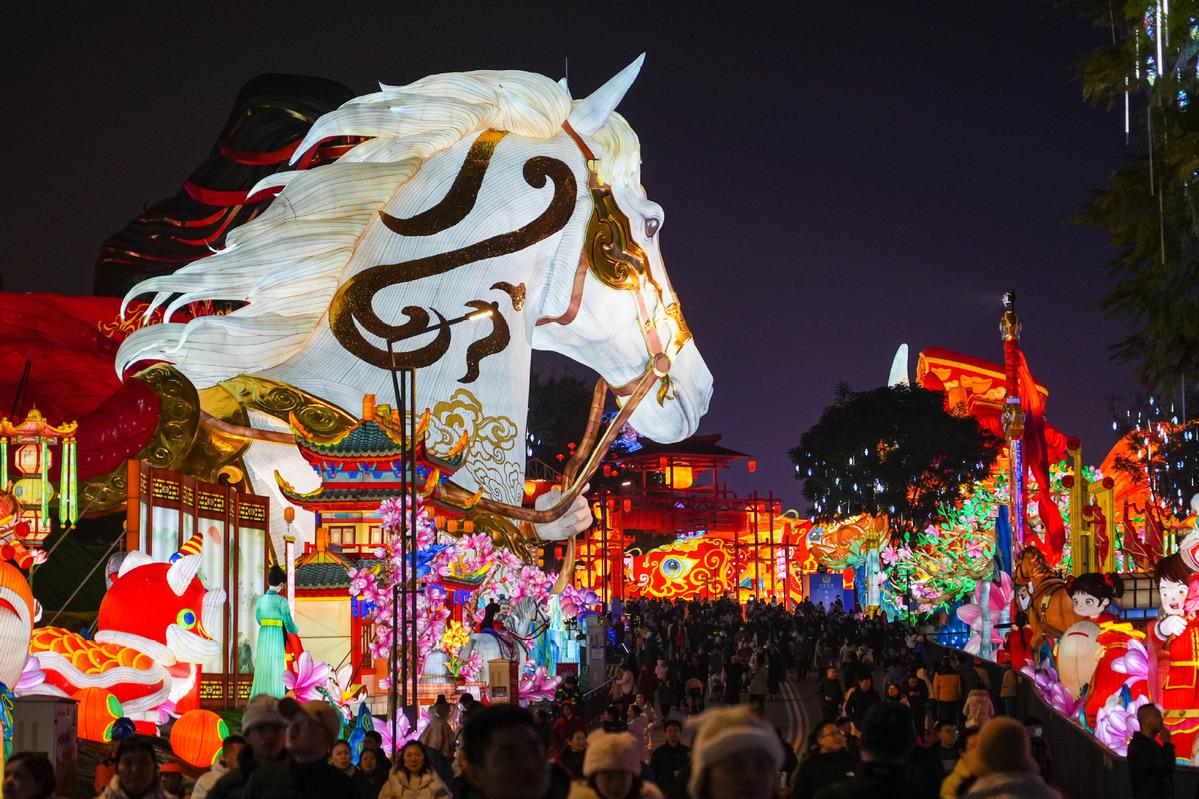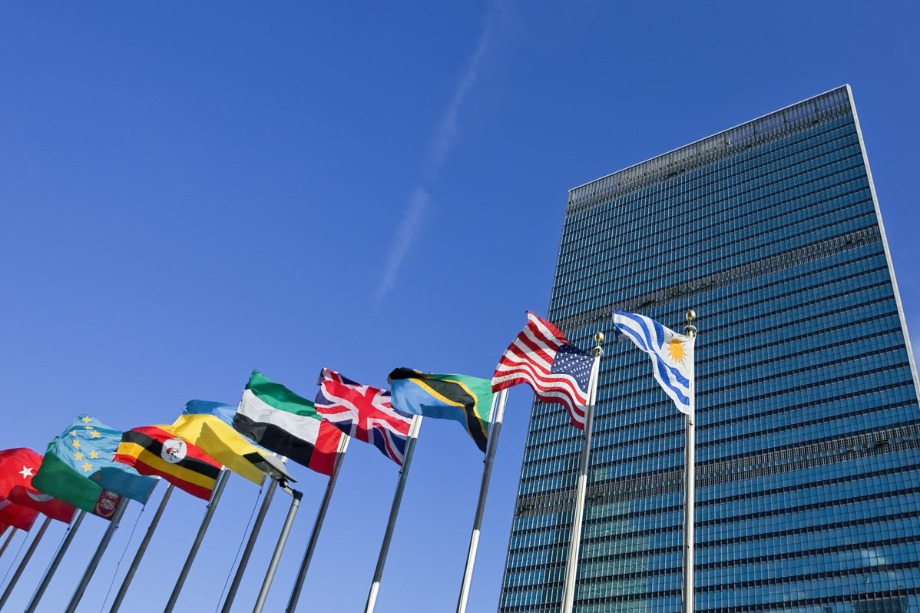CPC Guidelines for Governing Xinjiang in the New Era: Practice and Achievements
The State Council Information Office of the People's Republic of China September 2025

III. CPC Guidelines for Governing Xinjiang in the New Era: Opening Up New Dimensions
Since the 18th CPC National Congress, the Party Central Committee with Xi Jinping at its core has drawn experience and lessons from past central authorities in governing Xinjiang, and continued to apply and improve the Party's best practices in this regard. It has adopted a systematic and holistic approach to planning and advancing fundamental, essential and long-term undertakings for the region's lasting peace and security. These efforts have explored new dimensions in Xinjiang's governance, enabling the Party to scale new heights in maintaining stability and driving development in the region.
The formulation and development of the CPC's guidelines for governing Xinjiang in the new era. The rejuvenation of the Chinese nation is interwoven with — and interacts with — global change on a scale unseen in a century. Consequently, the strategic role of Xinjiang has become ever more pivotal to the nation's overall trajectory. Prioritizing Xinjiang in the governance of the country, the CPC Central Committee with Xi Jinping at its core has systematically planned all work related to Xinjiang from an overall strategic perspective and provided answers to a series of questions on the future direction and strategy in governing the region.
General Secretary Xi has always paid close attention to the work related to Xinjiang, from a place of care for the people of all of its ethnic groups. At each critical stage in work related to Xinjiang, he has provided strategic direction and guidance, personally steering the course of its development. In April 2014, during an inspection visit to Xinjiang, he highlighted, "The CPC Central Committee has continued to attach great importance to the work related to Xinjiang, emphasizing Xinjiang's special and important strategic role in the work of the Party and the country." He emphasized the major principles and policies of the central leadership to improve the work related to Xinjiang in the new era, and the need to "take a coordinated approach in all undertakings with a focus on social stability and lasting peace and security". In May 2014, the CPC Central Committee held its second meeting on the work related to Xinjiang, at which it reiterated its major principles and policies in this effort and established social stability and lasting peace and security as the overall goal.
After the meeting, Xi presided over a number of important meetings of the Political Bureau of the CPC Central Committee and its standing committee, to make plans for the work related to Xinjiang. In September 2020, at the third central meeting on the work related to Xinjiang held by the CPC Central Committee, he raised the CPC's guidelines for governing Xinjiang in the new era, explaining them in detail. He emphasized governing Xinjiang in accordance with the law, maintaining stability through ethnic unity, strengthening cultural identity and bonds, bringing greater prosperity to the region and its people, and developing Xinjiang from a long-term perspective, to build a socialist Xinjiang with Chinese characteristics in the new era.
In July 2022, on another inspection visit to Xinjiang, Xi pointed out the need to promote the fundamental, essential and long-term undertakings for Xinjiang's lasting peace and security, with a focus on the overall goal. In August 2023, he visited Xinjiang again to hear reports about the work of the Xinjiang Uygur Autonomous Region government and the XPCC. He emphasized the full, accurate and faithful implementation of the Party's guidelines for governing Xinjiang in the new era, and the strategic positioning of Xinjiang in the country. With the overall goal in mind, we will make thorough and meticulous efforts to deliver practical results in governing Xinjiang in accordance with the law, maintaining stability through ethnic unity, strengthening cultural identity and bonds, bringing greater prosperity to the region and its people, and developing Xinjiang from a long-term perspective. We will pursue progress while ensuring stability, devote continued and long-term sustained efforts in our work, and build Xinjiang into a beautiful home characterized by unity, harmony, prosperity, cultural progress, and a sound eco-environment in which people live and work in peace and contentment on the path to Chinese modernization. In addition, he has delivered speeches, made remarks, and provided instructions on many occasions, putting forward new ideas, perspectives and requirements on improving the work related to Xinjiang that have further enriched and developed the CPC's guidelines for governing Xinjiang in the new era.
The essence of the CPC's guidelines for governing Xinjiang in the new era. The CPC's guidelines for governing Xinjiang in the new era represent a thorough understanding of the situation in Xinjiang and embody a profound reflection on the work related to the region by the CPC Central Committee with Xi Jinping at its core. They comprise a complete system of theories with a sound logic and rich content, and sit at the core of all work related to Xinjiang in the new era. Their main content is as follows:
Viewing and planning the work related to Xinjiang from a strategic perspective. The work related to Xinjiang bears not only on national reunification, ethnic unity, and national security, but also on the initiative to build China into a great country and the goal of national rejuvenation. We must have a clear understanding of the prevailing trend of development in Xinjiang, of the impact of good work in Xinjiang on the overall situation of the Party and the country, and of the work's significance in addressing both domestic and international imperatives, thereby laying a solid foundation for its long-term development, peace and security.
Upholding social stability and lasting peace and security as the overall goal of the work related to Xinjiang. This means that all undertakings must be planned and advanced to achieve this goal. We should both channel our resources to address the pressing problems in maintaining social stability and systematically tackle the deep-rooted issues that undermine Xinjiang's lasting peace and security.
Rallying the people's support is fundamental. Without the people's support, all efforts are futile. We must put the people first, have faith in the people of all ethnic groups, rely on them, and be of service to them. We should provide them with guidance, and let them understand the importance of stability and peace, that a happy life stems from the Party's good policies and the hard work of all ethnic groups united as one, and that the development of Xinjiang cannot be achieved without the support from the whole Party and the whole country.
Fostering a stronger sense of the Chinese nation as one community. This is fundamental to the work related to Xinjiang in the long run. We must focus on fostering a stronger sense of national identity, fully implement the Party's policies concerning ethnic affairs, and heighten public awareness of ethnic unity and progress. We must move faster to build an ethnically integrated society and neighborhoods and encourage more exchanges, interactions and integration among different ethnic groups, so that they remain as closely united as the seeds of a pomegranate.
Ensuring that religions in China conform to China's realities. This concerns the overall work related to Xinjiang. We must fully implement the Party's basic policy on religious affairs, protect lawful practices, proscribe illegal activities, contain extremism, resist infiltration, and punish crime. We must guide religious believers to foster a keen sense of national identity, citizenship, and law-based governance, and provide active guidance to religions so that they can adapt to socialist society.
Fostering and carrying forward the core socialist values. We must uphold the guiding role of advanced socialist culture and strengthen the cultural identity and bonds of people in Xinjiang. We must guide the people and inspire them to identify more closely with our motherland, the Chinese nation, the Chinese culture, the CPC, and socialism with Chinese characteristics.
Promoting high-quality development centered on the people's wellbeing. Xinjiang's development should manifest in the people's wellbeing, betterment of local economy and society, and greater ethnic unity. We must uphold the people-centered development philosophy, and advance economic and social development while improving people's wellbeing so that the people of all ethnic groups live and work in peace and contentment, thereby enabling them to enjoy a stronger sense of gain, fulfillment and security.
Strengthening the Party's leadership over the work related to Xinjiang. To improve the work related to Xinjiang, we must uphold and strengthen the Party's overall leadership, cultivate a contingent of officials with strong political commitment, professional competence, and exemplary conduct, and ensure the smooth execution of the Central Committee's policies and decisions. We must regard building solid foundations at the grassroots level as the fundamental measure to ensure stability and security in Xinjiang, and strengthen grassroots Party organizations to serve the people, maintain stability, and oppose division.
The principles and requirements of the CPC's guidelines for governing Xinjiang in the new era. The CPC's guidelines for governing Xinjiang in the new era are the foundation for the work related to Xinjiang. We must have a thorough understanding of governing Xinjiang in accordance with the law, maintaining stability through ethnic unity, strengthening cultural identity and bonds, bringing greater prosperity to the region and its people, and developing Xinjiang from a long-term perspective, and advance these undertakings in a coordinated manner.
To govern the region in accordance with the law, we should uphold Xi Jinping Thought on the Rule of Law, advance law-based governance, promote its concept across society, adhere to its principles, and implement its requirements in all sectors of the work related to Xinjiang. We should employ law-based thinking and approaches to forestall risks, combat crimes, handle problems, and address disputes, and strengthen law-based and persistent efforts in combating terrorism and maintaining stability, thereby ensuring that all the work related to Xinjiang is carried out under the rule of law.
To maintain stability through ethnic unity, the fundamental issue is to rally people's support. We should regard ethnic unity as the lifeline of the people of all ethnic groups, safeguard the unity of the Chinese nation, and continue to foster a stronger sense of the Chinese nation as one community. We should make systematic efforts to ensure that religions in China conform to China's realities, to unite the people of all ethnic groups closer around the Party, and to forge tremendous momentum to build a beautiful Xinjiang.
To strengthen cultural identity and bonds, we should see that people in Xinjiang identify with the Chinese culture. Upholding the core socialist values, we should develop advanced socialist culture, promote revolutionary culture, carry forward the best of traditional Chinese culture, and build a spiritual home shared by all the Chinese people. We should provide education and guidance to the people of all ethnic groups to strengthen their sense of Chinese national identity, and reinforce their political commitment and win their support, thus consolidating the ideological foundations for social stability and lasting peace and security.
To bring greater prosperity to Xinjiang and its people, we should fully and faithfully apply the new development philosophy on all fronts in line with the strategic positioning of Xinjiang in building a great modern socialist country. Giving full play to Xinjiang's advantages in geographic location, resources, and policies, we should actively support Xinjiang in serving and integrating with the new development dynamic and promoting high-quality opening up. We should advance high-quality development centered on the people's wellbeing, and ensure that the benefits of development improve the people's wellbeing and win their support.
To develop Xinjiang from a long-term perspective, we should uphold and strengthen the Party's overall leadership and advance the great new project of strengthening the Party in the new era. We should foster highly competent officials based on the criteria for assessing the caliber of officials in the new era, maintain our strategic resolve, and make meticulous plans before taking any actions. We should pursue progress while ensuring stability, devote continued and long-term sustained efforts in our work, and address deep-rooted problems, to lay solid foundations for achieving the overall goal of the work related to Xinjiang.
The CPC's guidelines for governing Xinjiang in the new era represent both innovations and breakthroughs in theory, and concrete plans and requirements for their implementation. Embodying Xi Jinping Thought on Socialism with Chinese Characteristics for a New Era, they encapsulate and build on the past successes of the CPC who lead the Chinese people in governing, stabilizing and developing Xinjiang. They have opened a wide avenue leading to steady and sustained progress in the work related to Xinjiang, marking a new height of the CPC's understanding of the underlying principles in border governance. They are a milestone in the Party's work related to Xinjiang and in the development of the region.
Under the strong leadership of the Party Central Committee and with the support of the whole country, over 26 million people of all ethnic groups in Xinjiang are applying the Party's guidelines for governing Xinjiang in the new era in full, to the letter, and in all fields. Keeping the requirements in mind, they are working hard with gratitude and forging ahead in the face of daunting challenges to translate into reality the grand blueprint for Xinjiang drawn up by the CPC Central Committee with Xi Jinping at its core.


































